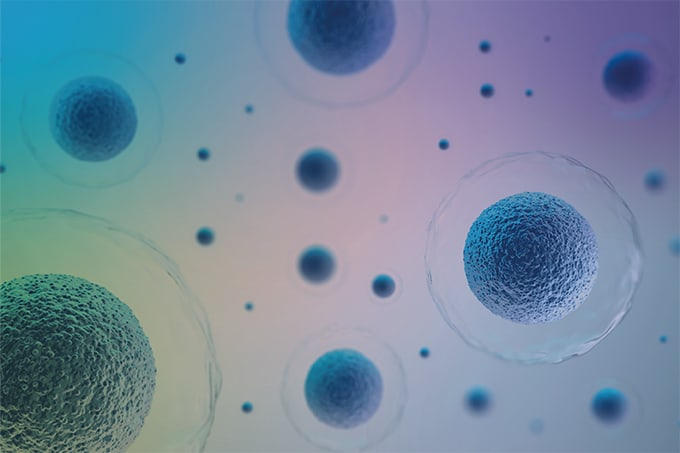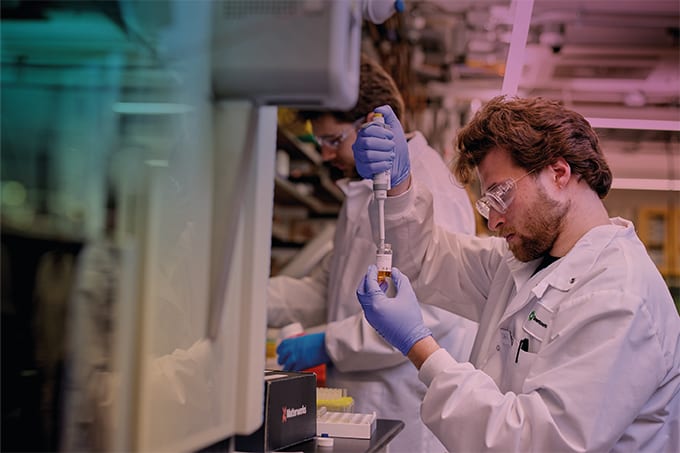Expanding high-throughput screening with acoustic ejection mass spectrometry
Produced by SCIEX
The Echo MS+ system integrates Acoustic Ejection Mass Spectrometry (AEMS) technology and Open Port Interface (OPI) sampling with the capabilities of the SCIEX ZenoTOF 7600 or Triple Quad 6500+ systems. This combination enables high-quality qualitative and quantitative results across a wide range of high-throughput screening workflows.
The system introduces flexible workflows for analyzing small and large molecules, utilizing high-resolution mass spectrometry for improved selectivity and sensitivity over traditional analytical methods. By combining rapid analysis, robust data quality, and low sample and reagent requirements, it offers a streamlined approach to early drug development, potentially reducing time, costs, and risks in decision-making.
What the judges say…
“An important addition to those performing high throughput clinical studies using MS.”
“Mass spectrometry keeps on innovating!”

Jose Castro-Perez

Chang Liu
Please introduce yourselves
Jose Castro-Perez, and I am the Vice President, Product Management at SCIEX. I lead the global SCIEX product portfolio for CE, LC/MS, software ecosystems and accessories.
Chang Liu, and I am a Staff Research Scientist at SCIEX. I specialize in advancing mass spectrometry (MS) front-end technologies, and develop innovative approaches to sample preparation, including the development of Acoustic Ejection Mass Spectrometry (AEMS) technology in the Echo MS+ system.
What impact could your innovation have?
Jose: The Echo MS+ system expands the use of the mass spectrometry by addressing throughput limitations that have historically constrained its application in critical workflows.
For example, in high-throughput screening, conventional approaches often rely on assumptions about the quality and expected concentrations of compound libraries. These assumptions can result in false positives and negatives, wasting valuable time and resources. Traditional LC-MS systems, with a throughput of approximately 2,000 compounds per week, are impractical for quality control of libraries containing millions of compounds. The Echo MS+ system overcomes this limitation by combining high data quality with significantly improved analytical throughput, a result we are seeing today.
Chang: Furthermore, the impact extends to high-throughput biomolecule characterizations, such as intact protein analysis. The Echo MS+ system accelerates the analysis of proteins to 1 second per sample, enabling rapid screening of covalent binders from large-scale libraries. This breakthrough capability brings transformative changes in the efficiency and speed of bio-molecule characterizations, addressing critical challenges in the drug discovery process.
Was there a key breakthrough or major “eureka” moment during development?
Chang: The development of this product has been an exciting journey, marked by several key breakthroughs. One memorable moment was the first successful demonstration of in-situ kinetics, allowing real-time analysis of reactions as they occur. Another milestone was the execution of our first large-scale screening, showcasing the scalability and efficiency of the technology.
Did you collaborate with any external teams during development?
Chang: We've been fortunate to receive a wealth of insightful feedback from research collaborators and early adopters of our technology. Engaging with early adopters has been particularly enlightening. By delving into the details of their workflows, we've been able to design and tailor our data processing options to meet their specific requirements, ensuring that the high-throughput capabilities of our technology do not create bottlenecks in downstream processes. This iterative feedback loop with has proven invaluable in refining and optimizing the AEMS platform to better serve the evolving needs of our customers.
What’s next for your team?
Jose: We are continuously learning, uncovering potential workflows and exploring new applications of this exciting technology. It's incredibly rewarding to see the potential of this innovation, from helping scientists to accelerate drug development, to enabling them to efficiently and effectively deliver improved therapeutic solutions to patients.




